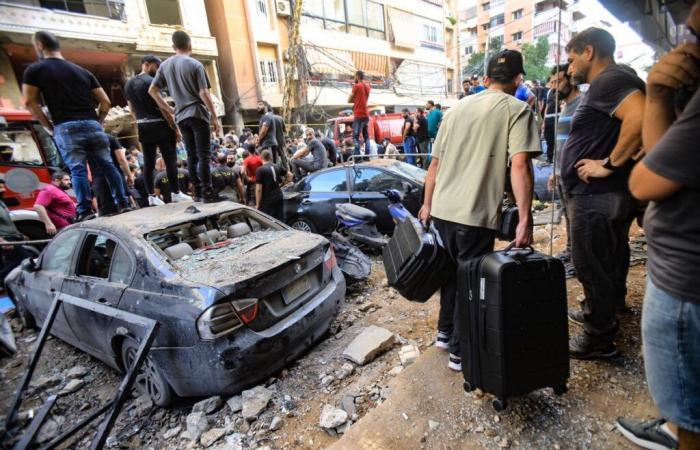– Two Hezbollah leaders killed near Beirut
The Lebanese movement announced the loss of two officials in the strike that took place on Friday, after its transmission devices exploded.
Published today at 10:53 a.m.
The war front in the Gaza Strip is shifting towards Lebanon.
AFP
Subscribe now and enjoy the audio playback feature.
BotTalk
Hezbollah announced Saturday the death of two of its leaders in the Israeli strike the day before near Beirut, which killed 16 members of its elite force and dealt a new blow to the Lebanese Islamist movement after the explosions of its transmission devices.
“Very concerned”, the UN called on Friday for “de-escalation” and “maximum restraint”, at a time when the front of the war in the Gaza Strip is moving towards Lebanon.
A source close to the movement announced Saturday that the Israeli strike carried out on Friday on the southern suburbs of Beirut had targeted a meeting in a basement of Hezbollah’s elite force, the Radwan unit, of which 16 members were killed.
Among them were Ibrahim Aqil, the head of this unit, as well as another senior commander of the elite unit, according to Hezbollah.
This is Ahmed Mahmoud Wahbi, who until the beginning of this year led the military operations of the Radwan unit in support of the Palestinian Hamas, at war with Israel in the Gaza Strip since October 7, 2023, the movement supported by Iran said on Saturday.
The Israeli army announced on Friday that it had carried out a “targeted” strike and “eliminated” Ibrahim Aqil as well as “a dozen commanders” of Hezbollah, “responsible for the daily rocket fire” on Israel.
Ibrahim Aqil is the second senior Hezbollah military commander eliminated by Israel since the movement opened the southern Lebanese front against the Israeli army nearly a year ago.
The United States had offered a $7 million reward for information on Ibrahim Aqil, who was wanted by Washington for his involvement in the bloody anti-American attacks in Beirut in 1983.
On Friday, an AFP photographer at the scene of the strike saw a collapsed building and rescue workers evacuating victims amid scenes of chaos.
“The targeting of a populated residential area proves once again that the Israeli enemy does not take into account any humanitarian considerations,” denounced Lebanese Prime Minister Najib Mikati.
“Our enemies have nowhere to take refuge”
Iran condemned a “flagrant violation (…) of the territorial integrity” of Lebanon, while the Israeli army assured that it was not seeking “a broad escalation” in the region.
“Our enemies have no place to take refuge, not even the (southern) suburbs of Beirut,” Israeli Defense Minister Yoav Gallant said.
Following the spectacular explosions on Tuesday and Wednesday, attributed to Israel, of transmission devices used by members of Hezbollah, which left 37 dead and 2,931 injured across Lebanon, the exchanges of fire have intensified since Thursday between the Israeli army and the Islamist movement.
Hezbollah leader Hassan Nasrallah said on Thursday that Israel would receive “a terrible punishment” after the two waves of explosions.
Israel has not commented on the attacks, which took place in the southern suburbs of Beirut and in southern and eastern Lebanon, three Hezbollah strongholds.
The head of Lebanese diplomacy, Abdallah Bou Habib, announced the filing of a complaint with the UN Security Council following “the Israeli cyberterrorist aggression which constitutes a war crime.”
International law “prohibits” the use of “booby-trapped” devices that appear to be “harmless” objects, the UN High Commissioner for Human Rights, Volker Türk, told the Security Council on Friday.
“Targeting thousands of individuals simultaneously, whether civilians or members of armed groups, without knowing who is in possession of the devices concerned (…) violates international humanitarian law,” he said.
The first wave of pager blasts came Tuesday shortly after Israel announced it was expanding its war aims to the northern front, the border with Lebanon, to allow tens of thousands of residents displaced by the violence to return home.
“The Lebanon front will remain open”
The main objectives stated so far were the destruction of Hamas, in power in Gaza since 2007 and considered a terrorist organisation by Israel, the United States and the European Union, and the return of the hostages held in the Palestinian territory.
“You will not be able to bring the people of the north” back home, Hassan Nasrallah retorted. “Lebanon’s front with Israel will remain open until the end of the aggression in Gaza,” he said.
The war in the Palestinian territory broke out on October 7, 2023, when Hamas commandos carried out an unprecedented attack on Israeli soil, which resulted in the deaths of 1,205 people, mostly civilians, according to an AFP count based on official Israeli figures that include hostages who died or were killed in captivity in the Gaza Strip.
Of the 251 people abducted during the attack, 97 are still being held in Gaza, 33 of whom have been declared dead by the army.
More than 41,272 Palestinians have been killed in the Israeli retaliatory offensive on the Gaza Strip, the majority of them civilians, according to data from the Hamas government’s health ministry in Gaza, deemed reliable by the UN.
AFP
Found an error? Please report it to us.
25 comments





